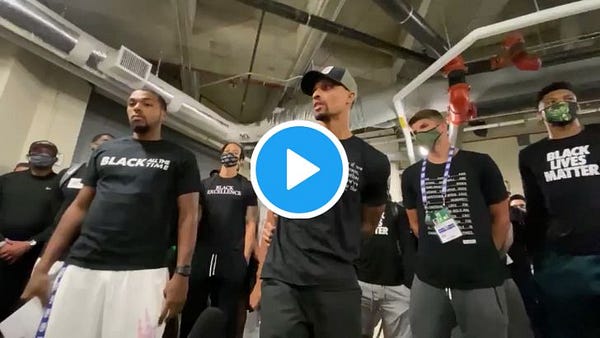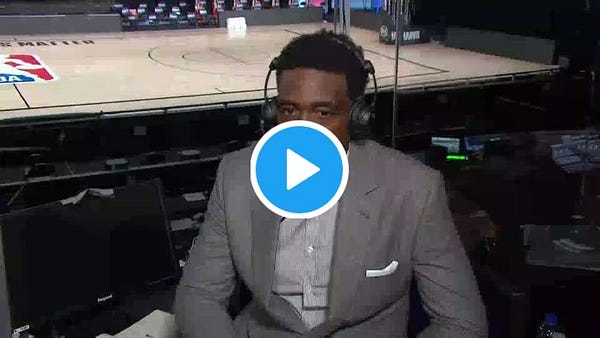The Game Has Changed
The sports world nearly ground to a halt last night after players sat out games in protest of systemic racism. What comes next is the key.
The Milwaukee Bucks were supposed to play the Orlando Magic in Game 5 of their playoff series Wednesday. Milwaukee was just one win away from advancing to the next round and is considered among the favorites to win the championship. But the Bucks did not take the court for warmups and still had not left the locker room when the buzzer sounded to signal the start of the game. The Magic left the floor and returned to their own locker room.
Reports soon emerged that the Bucks were refusing to play in protest over the shooting of Jacob Blake by police in Kenosha, which is just a half hour away from Milwaukee. The game never happened. Instead the Bucks planned. They contacted the Wisconsin attorney general and the lieutenant governor. Hours after the game was supposed to tip off, the players emerged to make a statement.
The other two games on the slate were postponed soon after the news about the Milwaukee game broke. Twitter soon flooded with impassioned messages from NBA players. Other leagues began to follow suit. All of the WNBA’s games were postponed for the day, and the players gave strong statements on television. The WNBA players has a long history of player activism and it was unsurprising to see them join in.
But almost nobody expected the Milwaukee Brewers, an MLB team, to join the protest. Such activism is almost unheard of within the modern game and yet the Milwaukee players, along with the Cincinnati Reds, their opponents, unanimously voted to not play. Games between the Dodgers and Giants, and Padres and Mariners (the team with by far the most Black players) were also postponed. Individual Black players on other teams also sat out or knelt during the national anthem.
Five MLS games were called off as players demonstrated in solidarity. Tennis star Naomi Osaka, the highest-paid female athlete in the world, announced she was pulling out of her semifinal match today. The tournament subsequently announced all play would be suspended until Friday.
This is a moment that is completely unprecedented in American sports. The word “boycott” was frequently used to describe the actions taken by the players. But boycotts involve the withholding of purchases, not labor.
This was a strike
It happened swiftly and with almost no prior warning but for the crushing dejection of Black players and coaches reacting to the shooting of Blake. The violence came after weeks of playing basketball in a controlled bubble with “Black Lives Matter” painted on the hardwood of the court and league-sanctioned social justice slogans on the backs of their jerseys.
The NBA’s players have been sequestered away at Disney World without their families and friends because of the pandemic. Part of the selling point of the bubble was that it could be used as a platform to promote change. The violence has not stopped. Blake is now paralyzed. Two protestors were gunned down by a white militia member who was allowed to walk away from the scene by the police.
The players did not think they could solve the problem by themselves. But they may now be realizing that the current plan is insufficient. Many were already wishing they could be back home protesting and organizing in their communities. This was the breaking point.
We don’t know if the NBA playoffs will continue. The players, coaches and officials held a contentious meeting last night, where the Lakers and Clippers voted against playing on. LeBron James is among those saying it’s time for action. Another meeting is happening this morning. There won’t be games today. The season is in jeopardy.
Regardless of whether the NBA comes back or not, the toothpaste is out of the tube. Something serious is in the air if six baseball teams are sitting games out to protest systemic racism. MLB culture is stuffy and conservative. The game is overwhelmingly white. The league’s gesture to acknowledge the murder of George Floyd was lackluster at best. When Mookie Betts knelt on Opening Day, he was alone. This time the Dodgers followed his lead and didn’t take the field because they wanted to.
This wasn’t just about the shooting of Jacob Blake and the subsequent murder of two protestors by Kyle Rittenhouse. It wasn’t just about lingering pain from the murders of George Floyd and Breonna Taylor. It wasn’t just about Bucks guard Sterling Brown being beaten by the police in 2018. It was about centuries of oppression and neglect. It was about the anger and pain caused by that oppression swirling together with a deadly pandemic. It was about the everyday mistreatment that BIPOC endure.
That pain is felt by countless BIPOC across the country who have been disproportionately hurt by the pandemic. There are wildfires burning in the west, a hurricane slamming into the gulf coast, protests and killings in the streets, and a government run by cruel racists. America is boiling over and now is the time for historic action to be taken.
So what comes next? That’s the key. The players have power. They have the capacity to force sweeping change, both by making demands of their employers and using their considerable platforms to speak directly to the people. James is reportedly in favor of pushing the owners to put their money where their mouths are. Other players are supposedly considering leaving the bubble to go back home to organize.
But I’d like to think about the possibilities beyond the sports world. Professional athletes have immense power due to their money and recognition. Yet we too have power. Our labor is vital to the perpetuation of the racist system that continues the oppression of BIPOC. The players involved in the strike across all sports withheld their labor to demand change. Everyday people have the capacity to do the same.
Does the movement spread into different industries? It probably won’t, but this is a potentially galvanizing moment. There’s a very real chance we’ve seen the last of the NBA this year. That would be something that forces people to pay attention, rather than just watching basketball and mentally filtering out the messages on the jerseys and floor.
The world stopped in its tracks when Utah Jazz center Rudy Gobert tested positive for COVID-19 and the NBA subsequently shut down. The league has now stopped again, and the world may once again change.
By refusing to play, the players forced people to listen. We have the same opportunity.








